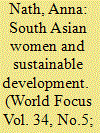| Srl | Item |
| 1 |
ID:
089387


|
|
|
|
|
| Publication |
2009.
|
| Summary/Abstract |
This article discusses the perpetration of Orientalism in the arena of contemporary South Asian literature in English: no longer an Orientalism propagated by Occidentals, but ironically enough, by Orientals, albeit by diasporic Orientals. This process, which is here termed as Re-Orientalism, dominates and, to a significant extent, distorts the representation of the Orient, seizing voice and platform, and once again consigning the Oriental within the Orient to a position of 'The Other'. The article begins by analysing and establishing the dominant positionality of diasporic South Asian women writers relative to their non-diasporic counterparts in the genre, particularly within the last half decade. It then identifies three problems with the techniques employed by some diasporic authors which have exacerbated the detrimental effects of Re-Orientalism; the pre-occupation with producing writing which is recognisably within the South Asian genre, the problem of generalisation and totalisation, and the insidious nature of 'truth claims'.
|
|
|
|
|
|
|
|
|
|
|
|
|
|
|
|
| 2 |
ID:
120947


|
|
|
| 3 |
ID:
143575


|
|
|
|
|
| Summary/Abstract |
South Asian women are a focus area for organisations such as the UN, World Bank and WHO, where violence against women severely constrains policy instruments such as the Millennium Development Goals. The field researcher is often invisible in research space, which informs policy in practice. Through critical reflexivity we rupture the silence on researcher vulnerability, foregrounding researcher resilience as the ethical compass in the research space of gendered violence. Through narratives of researchers as development actors in the river of corrosiveness involved in acid violence research, we offer a typology for researcher resilience for consideration in research designs for policy development.
|
|
|
|
|
|
|
|
|
|
|
|
|
|
|
|